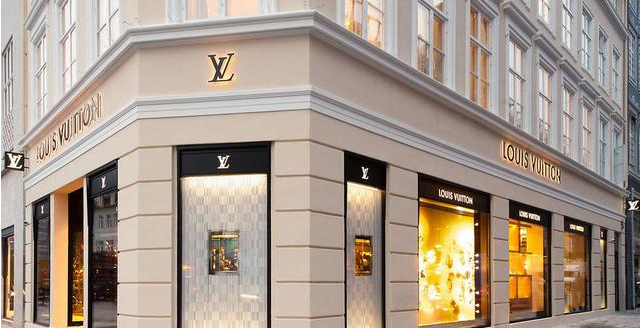
On October 10th local time, luxury goods giant LVMH Group, headquartered in France, announced its performance report for the third quarter of this fiscal year. The operating revenue in the third quarter was 19.96 billion euros, lower than analysts' expectations of 21.14 billion euros, with a year-on-year growth of 9%. The growth rate of organic revenue in the first three quarters of this year slowed to 14%.
It is reported that due to the continuous decline in consumer demand, European luxury goods stocks have shown a sharp decline since September, with their market value evaporating over $25 billion. The stock price of global luxury goods giant LVMH fell 3.6%, with its market value falling below $400 billion. Previously, LVMH Group became the world's first European company with a market value of $500 billion, and the luxury goods sector also became the rising core of the European stock market.
It should be pointed out that LVMH Group is not the only luxury goods company that has encountered a Waterloo. International luxury goods groups such as Richemont Group, Swatch, Kaiyun, and Hermes have also experienced varying degrees of stock price decline, demonstrating a "relatively sluggish" market situation.
Taking Kaiyun Group as an example, in the three months ended June, Kaiyun Group's North American sales decreased by 23% compared to the same period last year, and its main brand, Gucci, performed poorly. At the same time, Kaiyun's performance in Asia Pacific increased by 11%, while in Western Europe it increased by 5%. Burberry and Prada's North American revenue decreased by 8% and 6% respectively. Jewellers Cartier and Vanke Yabao's parent company, Richemont Group, also stated that demand in the US market is particularly weak.
A comprehensive analysis of the reasons for the decline in luxury goods sales in Europe includes the following aspects:
Firstly, against the backdrop of slowing global economic growth and intensifying trade frictions, the confidence of luxury consumers has also been impacted, which has put great pressure on sales growth. Taking the United States as an example, although during the pandemic, the American people were flush with cash after a large amount of epidemic subsidies, driving luxury goods sales into the peak season. In 2022, the United States' share of global luxury goods sales increased from 22% in 2019 to 33%, representing a nearly doubling of its luxury goods market size within three years. But as the Federal Reserve began raising interest rates, the constant rise in interest rates sparked fears of economic recession, leading many American consumers to reduce luxury spending and start accumulating savings.
Secondly, sustained inflation is an important factor in driving down consumer demand. Robert, the major shareholder and chairman of Cartier's parent company, Richemont Group, pointed out that inflation is reducing market demand. Richard, the chairman of Valentino, even holds a pessimistic attitude towards the prospects of the luxury goods industry, predicting that the growth rate of luxury goods will be less than 10% in 2023.
Thirdly, the uncertainty of the economic environment has affected the entire luxury goods market, and other brands, including LV, are facing similar challenges. Currently, due to the severe escalation of the Israeli-Palestinian conflict, a series of international fashion brands such as Zara, Mango, and H&M have decided to suspend their business in Israel, which is an important microcosm of the environmental impact on the market.
In addition, insufficient product innovation is also an important reason for the cold sales. Although LV's bags, perfume and other products have always been the products that consumers are keen to buy, with the change of the market and the constant change of consumer demand, LV has not kept up with consumer demand in terms of product innovation. If LV cannot innovate its products in a timely manner, consumers may turn to other more attractive products.
For centuries, Europe has gained absolute dominance and considerable profits in the field of luxury goods, with nearly two-thirds of global luxury sales flowing to Europe, and the long-term bull market in European stock markets can also confirm this.
Industry data shows that while technology companies represented by the United States have grown rapidly in the past decade, the European luxury goods industry is also unwilling to lag behind. Since 2010, the market value share of the top ten technology companies in the United States has almost tripled, accounting for 25% of the total market value of the US stock market.
At the same time, the market value share of the top ten luxury goods stocks in Europe has increased by about twice, accounting for 15% of the total market value of the European stock market, with most of the increase achieved in the past year.
Undoubtedly, technological innovation contributes far more to productivity than luxury goods, and while countries around the world are committed to technological innovation, Europe has always relied on luxury consumption to harvest world wealth. Whether Europe is overly reliant on this industry, which is widely regarded as a symbol of decline, and how long it can continue to rely on luxury goods with extremely high brand premiums to harvest the world under the current global trend, is now a widely questioned question, and the public is waiting to see.

From the stiff step when it first debuted in 2022 to demonstrating complex movements such as running and stir frying in 2025, Musk's "Optimus Prime" robot has always dominated the global technology hot search.
From the stiff step when it first debuted in 2022 to demons…
"On the early morning of January3,2026, the United States l…
"We absolutely need Greenland," Trump's straightforward sta…
On January 3rd, the US Special Forces launched a surprise a…
Since Donald Trump's re-election as US president, his famil…
At the beginning of 2026, the United States launched a mili…